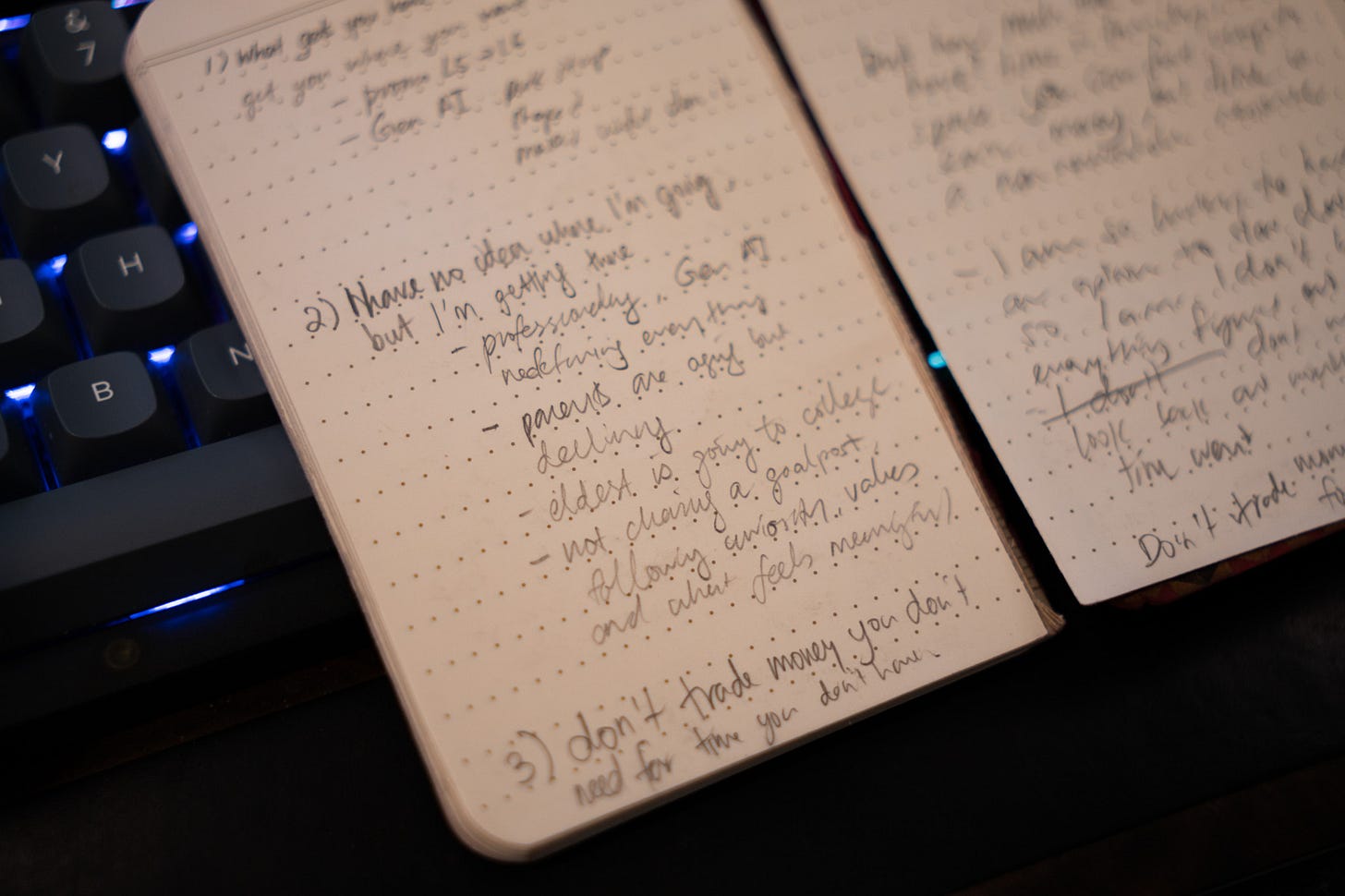Writing Is Thinking Made Visible
An engineer's system for using AI to write without outsourcing your brain
“If you’re thinking without writing, you only think you’re thinking.”
That quote should terrify every engineer who prides themselves on logical thinking. For years, I dismissed it. I was wrong.
I recently took an early exit from Big Tech. The plan was to spend my newfound freedom doing “vibe coding” - building whatever felt interesting without sprint deadlines or OKRs. Instead, I’ve been writing almost every day. Twenty-seven articles in about eight weeks, to be exact. Not because I suddenly fell in love with the craft of prose, but because I discovered something I wish I’d understood years earlier: writing is thinking made visible.
Here’s the honest truth: I don’t naturally enjoy writing. Never have. The core ideas excite me, but fleshing them out? That feels like work in a way that coding never does. But I’ve learned that communicating - and writing is just async communication with yourself and others - is perhaps the most important skill you can develop as an engineer, especially as you get more senior.
Since leaving Big Tech, something in writing has become even clearer. When I’m not surrounded by meetings and standups forcing me to articulate my thoughts, I need another mechanism to process ideas. Writing became that mechanism.
What surprised me is that writing is meditative. When I sit with my notebook or keyboard, the half-formed thoughts start to organize themselves. The act of forcing vague ideas into concrete words is like building a prototype and seeing what works, and what doesn’t. It’s debugging for your brain and your thought process.
So yes, I write a lot more now. Daily. Sometimes multiple times a day. And despite my initial resistance, I’ve grown to appreciate it - maybe even like it. Here’s what I’ve learned about writing as an engineer who never thought it was part of my job description.
Writing Makes Thinking Visible
Here’s what I’ve discovered through daily writing: if you can’t write it clearly, you haven’t thought it through clearly. Writing forces you to materialize and serialize the parallel processes running in your head - suddenly you see where your logic breaks down. Maybe LLMs are not so different from us after all - we both need to serialize our thoughts to make sense of them.
Writing about something reveals that you didn’t know it as well as you thought. Paul Graham captures this perfectly in “Putting Ideas into Words” - the act of writing often shows us that our seemingly complete ideas are actually half-formed. This also reminds me of my article about teaching (even to yourself) might be one of the best ways to learn.
Ideas can feel complete in your head. It’s only when you try to put them into words that you discover they’re not. And here’s the kicker - often something like half the ideas that end up in my writing are the ones I thought of while writing.
I primarily write for myself. This might sound counterintuitive when everyone preaches “know your audience,” but writing to clarify my own thinking is what makes the content valuable to others. When I write to genuinely understand something - like how to find a new data source for a product, or what’s really happening with AI development - that authenticity comes through. I am trying hard to cut straight to the point. Writing any other way for me feels like fluff.
The higher you climb in tech, the more your job becomes about evangelizing ideas rather than implementing them. You’re writing vision docs, design docs, post-mortems, team updates, and those crucial “here’s why we should/shouldn’t do X” emails. Your keyboard becomes less about coding and more about convincing. This is the reality of senior tech work that nobody tells you: past a certain level, your ability to write clearly matters more than your ability to code cleverly.
My Handwritten Notes + AI + Heavy Editing Pipeline
So how does someone who doesn’t enjoy writing actually write every day? I actually start with pen and paper. There’s something about the physical act of writing that bypasses the performance anxiety of a blank screen. No backspace key. No blinking cursor judging you. Just thoughts flowing onto paper.
(A photo of my handwritten notes with the one-liner “don’t trade money you don’t need for time you don’t have”.)
Research backs this up - handwriting slows you down enough to process what you’re writing more deeply. It’s the difference between transcribing thoughts and actually thinking. I carry a small notebook everywhere because ideas don’t wait for convenient moments. Folks who know me will remember that I always have a Field Notes notebook and my favorite mechanical pencil.
My process looks like this:
Handwritten brain dump: Key phrases, one-liners (can you tell I love my one-liners?!), rough structure
AI expansion: “Here’s my outline and key points, help me flesh this out”
Heavy editing: Making sure it sounds like me - often even cutting out whole sections and rewriting it based on what AI wrote
Ship it: Because perfection is the enemy of done
The AI partnership solves the universal writing challenge: getting a bad first draft down fast. Even if the initial output is wrong, it gives you something to react against. It’s easier to edit bad writing than to create from nothing. I think of this as pair programming for prose - the AI writes the first draft, and I refactor it into something I could have actually written.
Good writing has a natural rhythm that must match the ideas within it. This is where the human touch becomes irreplaceable. AI can generate text, but it can’t feel when the rhythm is off. That’s why heavy editing isn’t optional - it’s where I restore the natural flow of thought of my style.
In Defense of (Some) AI Writing
This pipeline I’ve developed - notebook to AI to heavy edits - might seem like cheating to writing purists. But here’s what I’ve learned: my daily writing habit wouldn’t be sustainable without AI assistance. Not because I can’t write, but because I can write better and faster with it.
AI solves the blank page problem. When I feed it my messy notes and half-formed ideas, it gives me something to react against. Sometimes it’s wrong. Often it’s too corporate (”let’s leverage our synergies to delve into key learnings”). But it’s something. And editing bad writing is infinitely easier than staring at an empty screen.
The AI helps me in specific ways. It connects ideas I didn’t realize were related, finding patterns in my scattered thoughts that I would have missed. It creates structure from my rambling notes, turning chaos into something that actually flows. Most helpfully, it fills in the boring connective tissue between interesting ideas - all those transitional phrases and explanatory bridges that I know need to exist but hate writing. And perhaps most importantly, it serves as a clarity test: if the AI misunderstands what I’m trying to say, readers definitely will too.
But here’s the crucial distinction: AI is creating a world divided into those who can write and those who can’t - which really means those who can think and those who can’t. As Graham warns in “Writes and Write-Nots”, the danger isn’t using AI; it’s letting AI do all the thinking.
That’s why the heavy editing phase is non-negotiable. AI can generate text, but it can’t know what’s worth saying. It can’t feel when the rhythm is off. It can’t inject that one-liner that makes everything click. Most importantly, it can’t decide what matters. Those decisions - what to keep, what to cut, what to emphasize - that’s where the thinking happens.
What Writing Has Taught Me
Some days, even with AI assistance, the words won’t come. The AI will confidently suggest something completely wrong, and I’ll spend more time fixing it than writing from scratch would have taken.
That’s fine. Writing is still hard - it’s supposed to be hard because to write well you have to think, and thinking is hard. But it’s a multiplier skill - it makes everything else you do more effective.
In retrospect I realize now that every design doc forced me to confront gaps in my logic. Every email about a vision revealed what isn’t resonating. Every technical proposal taught me the difference between what I actually understood versus what I thought I understood. I would have admitted that writing made my thinking clearer even back then, but I still ended up not writing more!
A few months ago, I thought I’d be spending my post-Big Tech life writing code. Instead, I discovered that writing words might be even more valuable. Not because I’ve become a writer, but because I’ve become a clearer thinker.
In a world where everyone can code, the person who can code and communicate wins. More importantly, in a world where AI can write, the person who can think - really think, through writing - becomes irreplaceable.
For me, the tools don’t matter. The clarity does.




“I primarily write for myself. This might sound counterintuitive when everyone preaches “know your audience,” but writing to clarify my own thinking is what makes the content valuable to others.”
-- this is the only way I can even finish writing an article.
I deeply agree with the idea that writing is debugging for the brain. Funny enough, I also found myself drifting away from writing when I started my career, focusing purely on execution. I really regret giving up my old blog—it was genuinely fun!
Your AI-assisted pipeline sounds incredibly efficient. That first draft generated by the LLM must be a game-changer for overcoming the inertia of the blank page. I've noticed the same thing: using AI handles the tedious connective tissue, letting me dedicate my limited energy to refining the core idea, which makes the whole process much faster now. The 'pair programming for prose' analogy is perfect. It really lets you focus on the 'what matters' decisions in the editing phase. Great read!